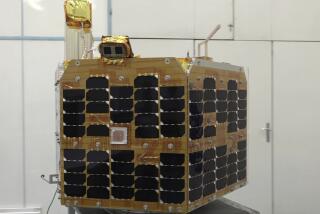REGIONAL POWER : Iran Re-Emerges as Troubling Question Mark in the Gulf : Possible meddling in southern Iraq is feared.
- Share via
TEHRAN — On the map, it is little more than a green blip in a haze of blue, a Persian Gulf island few ever heard of. But the island of Abu Musa lies just at the mouth of the narrow Strait of Hormuz, through which passes a fifth of the world’s oil supplies.
When Iranian military officials recently refused to allow a United Arab Emirates boat full of Abu Musans to dock at the island, and when Iran Radio last week proclaimed that the island--shared by Iran and the Emirates since 1971--was the sole property of the Islamic republic, many in this region took notice.
Volleys of hostile words have been lobbed again between Arabs and Persians across the strategic Gulf in recent days, and with added fears of Iranian meddling in Shiite Muslim areas of southern Iraq, Iran is re-emerging as one of the most troubling question marks in the turbulent Mideast.
“Iran’s policies toward the Gulf Arab states, as exemplified by its heavy-handed assertion of authority on Abu Musa island, have shown it to be an increasingly truculent neighbor,” U.S. Assistant Secretary of State Edward P. Djerejian said last week, although he added that Iran “can contribute to regional security if it chooses a constructive path.”
Just as Iran was rolling back its revolutionary rhetoric and mending fences with the Arab sheikdoms across the Gulf, its aggressive rearmament program and the allied ban on Iraqi flights over southern Iraq have opened the possibility of a new Iran that would be not only a quiet partner in the Gulf but an emerging Gulf power.
Last week’s announcement that Iran had agreed with China on acquisition of nuclear technology only heightened the unease.
The Arabs have reacted with frank alarm to the Abu Musa dispute, and the United States, which still claims evidence of Iranian involvement in international terrorism, called the Chinese nuclear agreement “highly imprudent.”
Analysts here, however, say the alarm bells may be premature. Iran may be doling out large sums for missiles, helicopters, fighter-bombers and other arms, but in an explosive neighborhood with the volatile former Soviet republics on Iran’s northern border, unpredictable Iraq to the west, heavily armed Arab sheikdoms across the Gulf and warring Afghanistan to the east, such a policy might be regarded as common sense.
“It’s not like they want an arms buildup. If you had Saddam (Hussein) as your neighbor, and you had the experience they’ve had, and no one really on your side, you would want to be self-sufficient in defense,” said one European diplomat.
Iran’s policy in the newly emerging Central Asian republics appears to be an indication of a new, pragmatic approach to foreign policy that focuses less on Islamic ideology and more on agricultural cooperation, customs agreements and credit lines.
Iran’s policy, so far, in southern Iraq may illustrate its pursuit of regional stability. While Arabs raised fears that the new allied “no-fly” zone might encourage Iraq’s breakup into an Iran-dominated Shiite state in the south, a Sunni state in the center and a Kurdish state in the north, Iran, instead of jumping at the chance, has raised precisely the same cautions.
The reason: Iran, for all its pretensions to Shiite solidarity, has more to lose from Iraq’s breakup than anyone in the region. A third of all Kurds, as many as 7 million, live in Iran, and a Kurdish republic in northern Iraq could impel them to join in.
Iranians have grown so fearful of the Iraqi Kurds that they have begun building a buffer zone in Kurdistan along the Iraqi border, moving Kurds there to the east.
More to Read
Sign up for Essential California
The most important California stories and recommendations in your inbox every morning.
You may occasionally receive promotional content from the Los Angeles Times.













